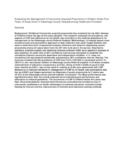| dc.contributor.author | Obanda, Lorna | |
| dc.contributor.author | Okoth, John | |
| dc.contributor.author | Ngarngar, Samuel | |
| dc.date.accessioned | 2021-12-08T17:04:18Z | |
| dc.date.available | 2021-12-08T17:04:18Z | |
| dc.date.issued | 2020-09-29 | |
| dc.identifier.uri | https://doi.org/10.5281/zenodo.3688626 | |
| dc.identifier.uri | https://zenodo.org/record/3688626#.YbDJUNBBzIU | |
| dc.identifier.uri | http://ir-library.mmust.ac.ke:8080/xmlui/handle/123456789/1805 | |
| dc.description.abstract | Background: Childhood Community acquired pneumonia has remained the top killer disease of Children below the age of five years globally. This research evaluated the prevalence, risk aspects of CAP and adherence by the health care providers to the national guidelines in its management at the Kakamega county Referral Hospital. Methodology: A hospital based cross sectional study and quantitative approach of data collection was used. Kappa Statistic was used to determine level of agreement between clinicians and observer diagnosing severe pneumonia among 33 cases taken from the 287 who took part in the survey. Descriptive statistics, bivariate logistic and statistical analysis software (SAS) were applied in analysis of data obtained. An odds ratio at 95% confidence interval was calculated to establish the correlation inherent among the dependent and independent variables. A ‘p’ value not exceeding 0.05 was deemed statistically substantial at 95% confidence interval. Results: The outcome revealed that the prevalence of CAP was 72.8% (182/250) in vaccinated and 81.1% (30/37) in non–vaccinated children at Kakamega county Referral hospital. In bivariate analysis maternal level of education none/primary (p=0.02), rating of child’s health as good in last three months (p=0.001), type of fuel used in cooking (p=0.04) were associated with CAP. Adherence to national standards in management of CAP by 33 health care participants was low (p=0.0001) and Kappa agreement on diagnosis of severe pneumonia by 2 raters was (57.6%) at the Kakamega county referral hospital. Conclusion: The Mean performance was significantly lower than the overall expected score indicating poor performance and adherence to national guidelines. The occurrence of CAP in children below five years was high. Recommendations: detected determinants be controlled and avoided by way of community mobilization on health advantages of maternal education, exclusive breast feeding for first six months, improvement of nutrition and improved cooking methods. | en_US |
| dc.language.iso | en | en_US |
| dc.publisher | Int journal of Recent Innovations in Medicine and Clinical Research | en_US |
| dc.subject | Evaluating, Management, Community, Acquired, Pneumonia, Children, Under Five Years | en_US |
| dc.title | Evaluating the Management of Community Acquired Pneumonia in Children Under Five Years | en_US |
| dc.title.alternative | A Study Done In Kakamega County Hospital among Healthcare Providers | en_US |
| dc.type | Article | en_US |

